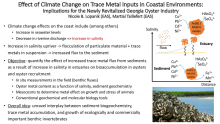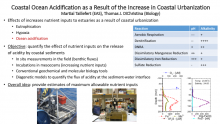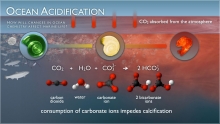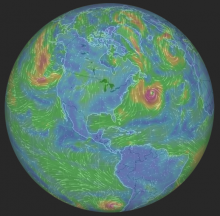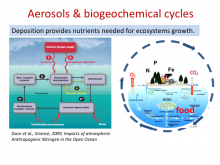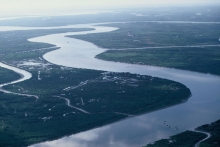The effects of climate change on the coastal ocean include a decrease in riverine inputs and increase in salinity in estuaries with impacts on primary production, macrofauna, and sediment biogeochemistry that are poorly understood. One clear effect of the increase in salinity associated with the decrease in riverine discharge, however, is the enhanced coagulation of inorganic material further upriver. Flocculation of particulate material upriver will enhance its flux to the sediment and simultaneously decrease the outflux of particulate material to the continental shelf.
The urbanization of the coast is generating significant environmental issues, including increasing nutrient runoff that promotes eutrophication and hypoxic conditions in estuaries. At the same time, the excessive input of nutrients is also responsible for an increase acidification of coastal waters, as denitrification in sediments typically generates acidity.
CO2 emission will continue exaggerating, as fossil fuels will most likely remain the major source of energy in next couple decades. The increased carbon in the atmosphere moves into marine ecosystems, making the world’s oceans more acidic. The rate of ocean acidification (OA) today is faster than any time in the past 300 million years.
A large fraction of ocean variability on interannual and longer timescales is energized by random atmospheric weather, also referred to as climate "noise". Although the noise is random in time, spatially the atmospheric noise exhibits recurrent patterns, some of which are more efficient in triggering positive feedbacks between the ocean-atmosphere system or more generally amplifying the response of the ocean system. Noise patterns such as these, can trigger resonance in the climate system.
The sustainability of human civilization and its evolving lifestyle depends fundamentally on a sustainable food and energy supply. This can largely be linked to the availability of reactive nitrogen (Nr), phosphorus (P) and trace-element nutrient availability for natural and managed ecosystems. Nr, P and Fe are known to stimulate productivity while other elements, like Cu and Mn, can be toxic for ecosystems. Nr is also a critical link for the carbon cycle, and directly/indirectly impacts climate and human/ecosystem health.
The exponential growth of human populations in the Mekong-South China Sea (SCS) system, the eutrophication of estuarine and coastal waters by excess nutrients transported by the Mekong River, and the rapid sinking of the Mekong Delta are fundamentally changing the biological productivity and biodiversity of the system, with uncertain implications these aquatic resources. In the near future, larger forcings will alter the linkages between the Mekong system and the SCS basin.

